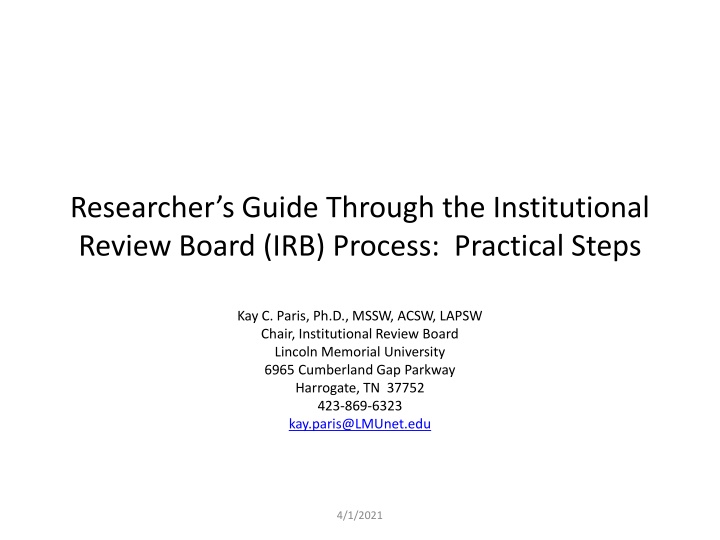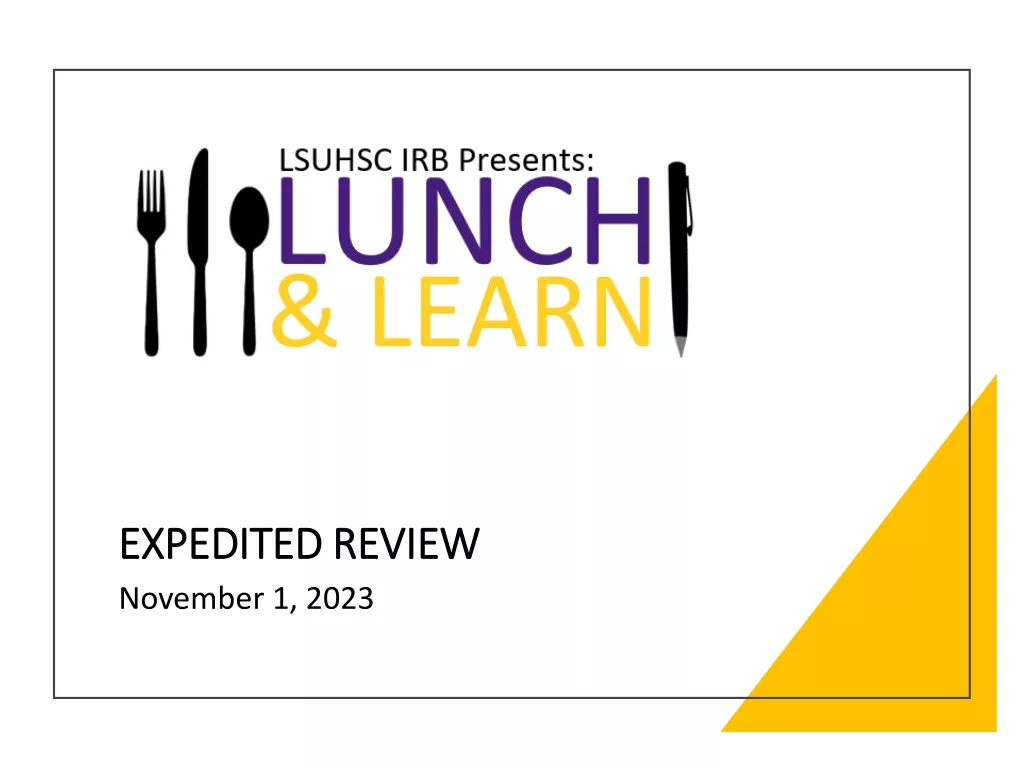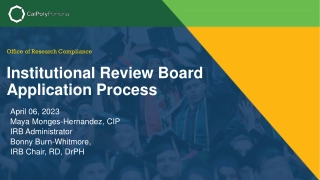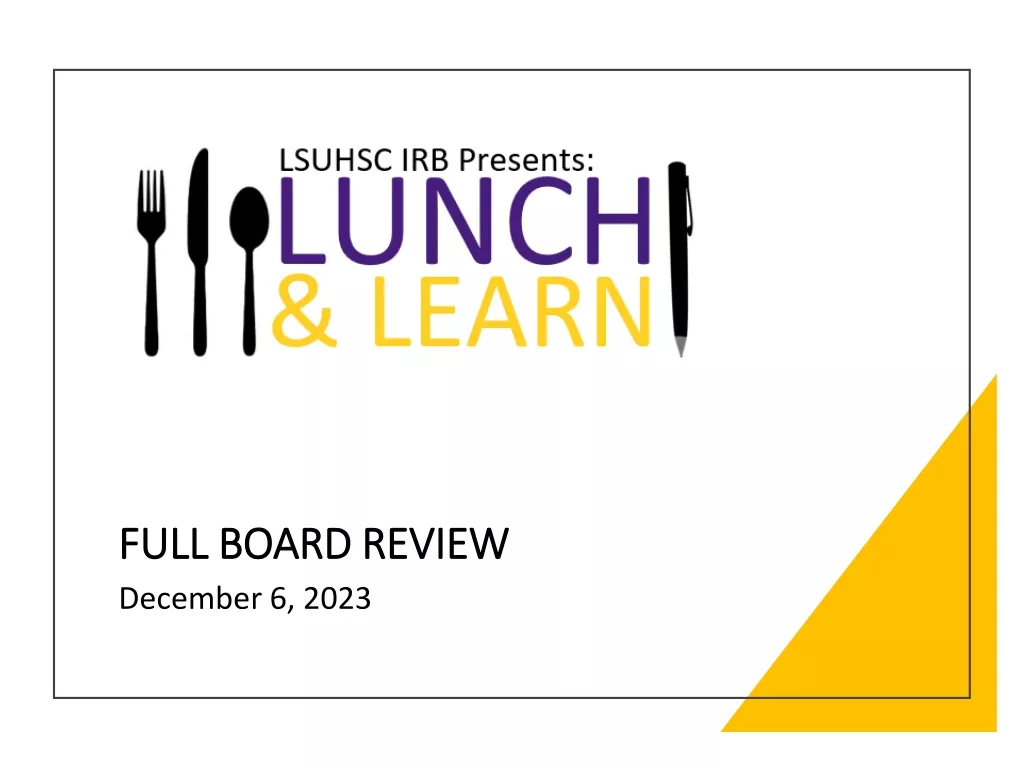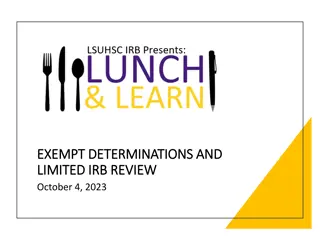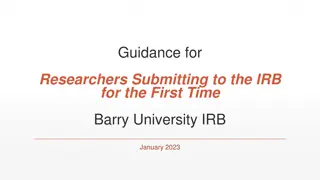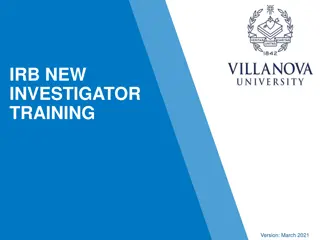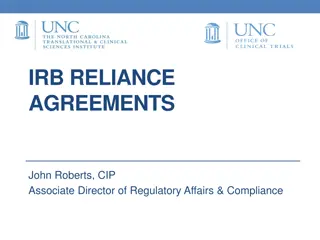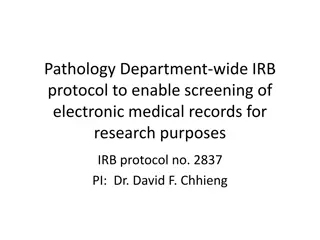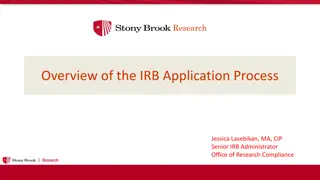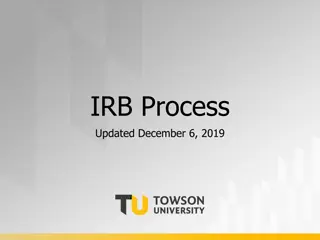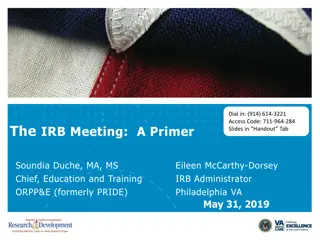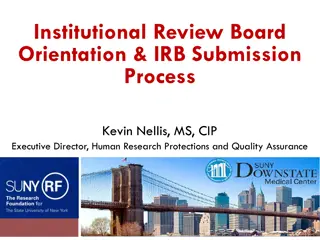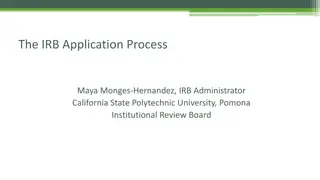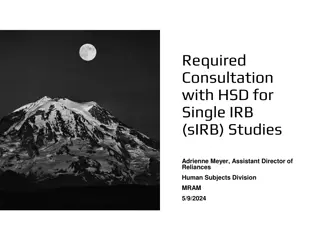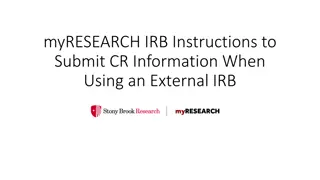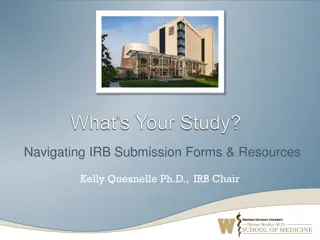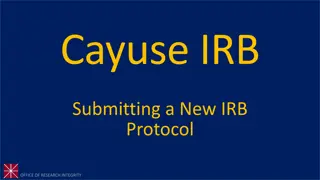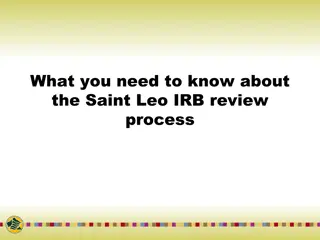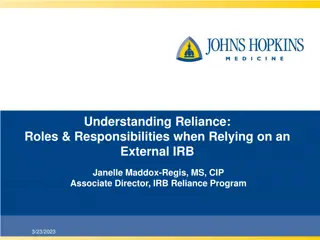Navigating the Institutional Review Board (IRB) Process: A Practical Guide
Understanding the IRB process is crucial for conducting ethical research involving human subjects. This guide outlines federal regulations, protective mechanisms, IRB goals, and the definition of human subjects in research. It also provides insights into the level of intervention, considerations when planning a research project, and the importance of informed consent. By following these steps and guidelines, researchers can ensure the protection of participants' rights and welfare.
Download Presentation

Please find below an Image/Link to download the presentation.
The content on the website is provided AS IS for your information and personal use only. It may not be sold, licensed, or shared on other websites without obtaining consent from the author.If you encounter any issues during the download, it is possible that the publisher has removed the file from their server.
You are allowed to download the files provided on this website for personal or commercial use, subject to the condition that they are used lawfully. All files are the property of their respective owners.
The content on the website is provided AS IS for your information and personal use only. It may not be sold, licensed, or shared on other websites without obtaining consent from the author.
E N D
Presentation Transcript
Researchers Guide Through the Institutional Review Board (IRB) Process: Practical Steps Kay C. Paris, Ph.D., MSSW, ACSW, LAPSW Chair, Institutional Review Board Lincoln Memorial University 6965 Cumberland Gap Parkway Harrogate, TN 37752 423-869-6323 kay.paris@LMUnet.edu 4/1/2021
Federal Regulations and Policy stemming from Belmont Principles 45 CFR 46 DHHS Policy for Protection of Human Research Subjects- Subpart A The Common Rule Revised and implemented on January 21, 2019 4/1/2021
Protective Mechanisms Established by the Common Rule Institutional Assurances of compliance LMU holds a Federal-wide Assurance agreement with HHS/OHRP Review of research by an Institutional Review Board (IRB) or Ethics Committee Informed consent of subjects 4/1/2021
Goals of the IRB Protect the rights and welfare of people participating in research Ten member volunteers appointed by LMU President Assist investigators in conducting ethical research that complies with the U.S. Code of Federal Regulations, DHHS (CFR), Title 45 Part 46 (45 CFR 46) Support the responsible conduct of research 4/1/2021
Human Subjects in Research Living individuals* about whom an investigator-- whether a professional or a student--conducting research obtains data through: intervention ,or interaction with the individual, or identifiable private information. Source: OHRP, 45 CFR 46 *Data and biospecimen repositories (materials transfer agreements) 4/1/2021
How much intervention is involved? Intervention Interaction Private information about behavior that occurs in a context in which an individual can reasonably expect that no observation or recording is taking place, and ..privacy means includes communication or interpersonal contact between investigator or subjects. manipulations of subjects or subjects environment that are performed for research purposes. 4/1/2021
When Planning A Research Project, An Investigator Should Consider the Following Questions: Does the activity or project involve minimal risk? probability and magnitude of harm or discomfort are not greater in and of themselves than those ordinarily encountered in daily life or doing the performance of routine physical or psychological examination or tests 45CFR46 4/1/2021
Risk to Researcher The risk of conducting the research in the selected setting or with specific clients is usually addressed by the Faculty sponsor, Department Chair, School ethics/research committee, or Risk Management office. IRBs have procedures with Departments and Schools to cover home visits and other settings before submitting the applications to the IRBs. IRB may contact PI and Faculty sponsor to clarify a risk review has occurred. 4/1/2021
Privacy and Confidentiality When appropriate, there are adequate provisions to protect the privacy of subjects and to maintain the confidentiality of data 45 CFR 46.111(a) Breaches of privacy and/or confidentiality are the main risk in social- behavioral research or research that is no greater than minimal risk. Mandated reporters? 4/1/2021
Does the research involve a vulnerable population? Vulnerable populations include: Children (all minors younger than 18 years of age in most states must also have parental consent) Pregnant women Institutionalized individuals (e.g., prisoners, individuals in group homes, nursing homes, mental institutions) Cognitively impaired individuals 4/1/2021
Other considerations may also count as Vulnerable : Language Culture Current Events or Incidents Age (elderly) Age (adolescents) Educationally, economically disadvantaged Transient Cognitive Impairment Substance Use Health Status Students Employees 4/1/2021
Things to consider when completing your application Is the proposal Clear? Concise? Consistent? Complete? Have I addressed Why? Who? What? Where? When? How? 4/1/2021
Application Form Project Title (consistent) Type of review IRB makes final decision Project dates approval date by IRB vs. researcher s planned dates Principal Investigator, co-investigators, faculty sponsor, research assistants, with signatures IRB Training and Certification dates (5 years) Student/Outside researcher information - Signature of a university sponsor Funding/Conflict of Interest statement Research statement: purpose of study and/or research question(s) Participants subjects, number of subjects, method of solicitation (employees, students, athletes) Informed consent (consent and assent forms), method to obtain Data & Consent collection methods data with identifiers, how confidentiality/anonymity will be protected, how and where will the data to be stored Methodology details specifics regarding contact, selection and exclusion, consent and assent process, data instruments (permission or purchase issues), distribution and collection of instruments, location with permission to distribute at school, agency, company Risk factors Submission of all materials recruitment flyers and emails, informed consent, data collection instrument(s), letters of permission, debriefing, media to show to participants 4/1/2021
Examples of projects that require IRB submission Interviews structured, semi-structured, open Focus groups Pretest intervention posttest (eg., analysis of writing samples, trainings) Surveys, including Internet-based surveys Experimental and quasi-experimental studies with intervention and control groups Data analysis of primary or secondary data that contain identifiers or codes chart reviews School-based research action research 4/1/2021
Translational Research the process of turning observations in the laboratory, clinic, and community into interventions that improve the health of individuals and populations from diagnostis and therapeutics to medical procedures and behavioral interventions. (NIH definition) 4/1/2021
IRB Training Requirements All persons named on the application (Principal Investigators, Co-PIs, Faculty Sponsors, and Research Assistants) must complete online CITI training and submit proof of completion along with their IRB application (must be updated since January 21, 2019) Members of the IRB are also required to complete specialized training modules through CITI and/or the University. LMU location: MyLMU to Administration to ORGSP to Institutional Review Board to CITI Training Website to Register to complete the modules for Social and Behavioral or Biomedical investigators (melissa.miracle02@lmunet.edu) 4/1/2021
Guidelines for Class Research Assignments Instructor Form This form does not cover students conducting research for independent study, theses, dissertations, articles, publications, or presentations outside the research class. class assignments, the instructor serves as the Principal Investigator and the students serve as research assistants. Please note that recruitment of participants outside the research class requires a complete, formal IRB application with either the instructor or student as the Principal Investigator. Exempt research de-identified, non-restricted public data or a data set developed/provided by the instructor, content analysis of articles/published speeches/public web sites (not FB, Twitter, etc.), surveys distributed within the research class, and focus groups within the research class would be covered by this form. Observation of public behavior with no interaction or intervention by the researcher would also be covered. Secondary analysis School-based educational action research projects that are part of learning research methods may also be conducted under this exempt research class form. 4/1/2021
Completing the Class Research Assignments Instructor Form Section 1. Provide the requested information on the instructor and chair. Section 2. Provide the requested class name and enrollment. Section 3. Provide the estimated project dates; note that a continuation form is to be submitted before the end of the approval date to continue the project for a second or third year. Section 4. Indicate the date of CITI training for the instructor and provide a list of student names with titles of projects and dates of CITI completion. Section 5. Check the appropriate box. Section 6. Please answer the questions completely and provide the requested documents including a copy of the syllabus that describes the assignments. Section 7. Please provide the appropriate signatures. 4/1/2021
Determined by the IRB Committee Exempt (Minimal risk for the study participants reviewed by the chair or designee, quick turnaround time 1-2 weeks) NOTE: Exempt does not mean exempt from review. Expedited (No more than minimal risk, reviewed by the chair and at least one IRB member, turnaround time-- allow 2-3 weeks) Full (More than Minimal Risk or vulnerable populations (children, pregnant women, prisoners); longer turnaround time, must be reviewed by full committee and discussed at monthly meeting--allow 6-8 weeks) NOTE: Review may take longer if application is not complete. 4/1/2021
Full Review Full Board: According to 45 CFR 46.110(b), full board review is required of all research studies that are neither exempt, nor subject to expedited review. IRB Committee must review and vote at a fully convened meeting. Meeting held once a month. Submissions must be processed at least one week prior to meeting. Deception/ Non disclosure of information to subjects. Studies with greater than minimal risk. Special/ Vulnerable Populations. 4/1/2021
Required elements of informed consent BASIC ELEMENTS 45 CFR 46.116(a) Statement that the study involves research Reasonably foreseeable risks/discomforts Reasonably expected benefits Disclosure of appropriate alternative procedures Confidentiality of identifiable records (HIPAA) For high risk, what happens if injured in research Whom to contact about research, problems, or concerns Participation is voluntary, refuse to participate without penalty, and discontinue participation at any time 4/1/2021
Faculty Compliance with IRB Requirements Tartaro and Levy (2014) examine 323 faculty in a social science discipline Over three-fourths of the respondents (78%) indicated that they thought researchers should not collect data before IRB approval and should not make a substantial change to protocol without notifying IRB. Over half of the respondents (57.3%) thought that researchers could make a minor change to the wording of a survey or informed consent without reporting to the IRB. Note that the date of IRB approval is to appear on the survey or informed consent document per LMU guidelines. 4/1/2021
Self-reported Violations of IRB Rules and Regulations Tartaro and Levy (2014) asked respondents about their IRB rule infractions within the past three years. The majority (59%) of respondents reported that they were in compliance. 41% self-reported that they had committed IRB rule infractions that ranged from one incident to 5 incidents. Reported infractions were those that were unlikely to harm human participants. Tartaro and Levy (2014, p. 337) Most of the violations involved minor wording changes to surveys and informed consent documents and beginning data collection on public documents or other data not involving human participants before IRB approval. IRB rule violations were attributed to the IRB taking too long to approve projects, being too restrictive, not understanding their discipline s research, and showing preferential treatment for certain researchers. Another reason given was that the researcher knows how to protect his/her subjects and do not need IRBs to review the project. 4/1/2021
Recommendations for Researchers Be aware of the timeline for submissions and for the University holiday closing times 2 week pre-meeting if requires full-board review). Check your IRB website for current forms, rule changes, and dates of monthly meetings. Secure written permission from the research site(s) before submitting the application. Some school systems and agencies have their own IRBs. Remember that rules may be applied differently at different Universities. Find out who are the members of the IRB that represent your school. Ask the IRB office (423-869-6834), IRB Chair (423-869-6323), or IRB member (school representative) to speak to your class or department. Ask the IRB office or IRB Chair for consultation times. Double check your IRB applications and supporting documents before submitting. Submit your complete application with signatures and all appendices by email to , melissa.miracle02@lmunet.edu in person to Grant Lee 108, or by fax at 423-869- 6258 NOTE: IRB Processing may be delayed due to missing information, incomplete information, inconsistencies, or the need for clarification of statements describing processes 4/1/2021
Reference Tartaro, C. & Levy, M.P. (2014). Criminal justice professionals knowledge of Institutional Review Boards (IRBs) and compliance with IRB Protocol. Journal of Criminal Justice Education, 25(3), 321-341, http://dx.doi.org/10.1080/10511253.2014.90 2982 4/1/2021
